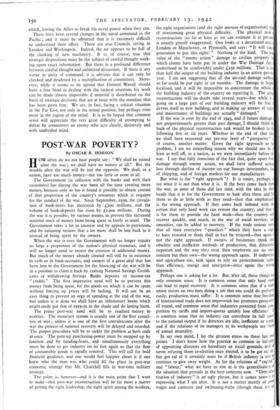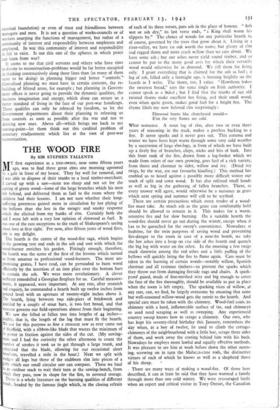POST-WAR POVERTY?
By OSCAR R.HOBSON
HOW often do we not hear people say : " We shall be ruined after the war ; we shall have no money at all." But the trouble after the war will be just the opposite. We shall, as a nation, have too much money—not too little or none at all.
The Government (in collusion with the banks and with their customers) has during the war been all the time creating more money, because only so has it found it possible to obtain control of that proportion of the country's resources which it requires for the conduct of the war. Since September, 1939, the circula- tion of bank-notes has increased by £200 millions, and the volume of bank-deposits has risen by Li,000 millions. During the war it is possible, by various means, to prevent this increased national stock of money from being spent as freely as usual. The Government takes a lot in taxation and by appeals to patriotism, and by rationing secures that a lot more shall be lent back to it instead of being spent by the owners.
When the war is over the Government will no longer require so large a proportion of the nation's physical resources, and it will no longer need to secure the creation of additional money. But much of the money already created will still be in existence in cash or in bank-accounts, and owners of a great deal that has been lent to the Government for the financing of the war will be in a position to claim it back by cashing National Savings Certifi- cates or withdrawing Savings Banks deposits or income-tax " credits." The first imperative need will be to prevent this money from being spent, for the goods on which it can be spent without forcing up prices will be lacking. It will not be an easy thing to prevent an orgy of spending at the end of the war, but unless it is done we shall have an inflationary boom which might easily put that of 1919-2o in the shade and do lasting harm.
The prime post-war need will be to readjust money to realities. The monetary system is usually one of the first casual- ties of war ; unless it is one of the first convalescents after the war the process of national recovery will be delayed and retarded. The proper procedure will be to tackle the problem at both ends at once. The pent-up purchasing-power must be mopped up by taxation and by funding-loans, and simultaneously everything must be done to get industry on its feet again so that the flow of consumable goods is rapidly restored. This will call for bold financial guidance, and one would feel happier about it if one knew who the man was who could fill the place in post-war economic strategy that Mr. Churchill fills in war-time military strategy.
The point is, however—and it is the main point that I want to make—that post-war reconstruction will be far more a matter of getting the right leadership, the right spirit among the workers, the right organisation (and the right amount of organisation) of overcoming great physical difficulty. The physical -task reconstruction (so far at least as we can estimate it at present is usually grossly exaggerated. One looks at a devastated area London or Manchester, or Plymouth, and says: " It will take
generation to put this right! " Nothing of the kind. The to value of the " enemy action " damage to civilian property f which claims have been put in under the War Damage Act understood to be comfortably under £150 millions. That is le, than half the output of the building industry in an active pre-w, year. I am not suggesting that all the air-raid damage suffer.
so far could be put right in six months. The damage is larg localised, and it will be impossible to concentrate the whole the building industry of the country on repairing it. The ac reconstruction will no doubt take several years—but while it going on a large part of our building industry will be free devote itself to new building, and to making up arrears of repast and maintenance of buildings not actually " damaged."
If the war is over by the end of 1943, and if future damageu not proportionately greater than past damage, I should think the back of the physical reconstruction task would be broken in the following five or six years. Whether at the end of that time we shall have recovered our pre-war level of "prosperity "1 of course, another matter. Given the right approach to the problem, I see no compelling reason why we should not be s least as well off, as a nation, as we were immediately before the war. I says that fully conscious of the fact that, quite apart from damage through enemy action, we shall have suffered serious loss through decline of income .on our foreign investments, 1. of shipping, and of foreign markets for our manufactures.
But what is the "right approach "? It is easier, perhaps, It say what it is not than what it is. If the boys come back from the war, as some of them did last time, with the idea in their heads that it is for the Government to look after them and fa them to do as little work as they need—then that emphaticalk is the wrong approach. If they come back imbued with the notion that only hard work can restore the country, and that it is for them to provide the hard work—then the country wil recover quickly, and much, in the war of social services and amenities, can be added to recovery. If the trade unions insist that all their restrictive " practices " which they have a right to have restored to them shall in fact be restored—that again it not the right approach. If owners of businesses think that obsolete and inefficient methods of production, that directorial nepotism and the way they treat their employees are no oil concern but their own—the wrong approach again. If industries, and agriculture too, seek again to rely on protectionism rather than efficiency, energy and enterprise—once again the wrong approach.
Perhaps one is asking for a lot. But, after all, these things are only common sense. It is common sense that only hard wort can lead to rapid recovery. It is common sense that if a trade union insists on two men doing a job that one could do perfect easily, production must suffer. It is common sense that freedom of international trade does not impoverish but promotes prosperity all round, and common sense that industries protected from con? petition by tariffs and import-quotas quickly lose efficiency. It is common sense that no industry can contribute its full quo to the national output if its directors are idle, inefficient or senile. and if the relations of its managers to its workpeople are these of armed neutrality.
In my own mind, I lay the greatest stress on these last two points. I don't know how the practice so common in industri of appointing directors on hereditary or social grounds, and d never refusing them re-election once elected, is to be got rid oil but got rid of it certainly must be if British industry is not td continue to give away weight. As for the relations of "capital and " labour," what we have to aim at is the generalisation the situation that prevails in the best concerns now. "Demacrk tisation of industry" is an ugly phrase, but it comes nearest re expressing what I am after. It is not a matter merely of gelocid wages and canteens and swimming-baths (though these are all
essential foundation) or even of trust and friendliness between managers and men. It is not a question of works-councils or of workers usurping the functions of management, but rather of a community of interest and responsibility between employers and employed. In war this community of interest and responsibility is felt to exist. Is not this one of the spheres in which peace can learn from war?
It seems to me that civil servants and others who have time to devote to reconstruction-problems would be far better occupied in thinking constructively along these lines than (as many of them seem to be doing) in planning bigger and better " controls." Centralised planning we must have in certain contexts, the re- building of blitzed areas, for example ; but planning in Govern- ment offices is never going to provide the dynamic qualities, the business imagination and energy, which alone can secure us a better standard of living in the face of our post-war handicaps. Those qualities can only be released by freedom, so let the Government departments direct their planning to releasing us from controls as soon as possible after the war and not to devising new ones. Above all—which brings me back to my starting-point—let them think out this cardinal problem of monetary readjustment which lies at the root of post-war reconstruction.



























 Previous page
Previous page